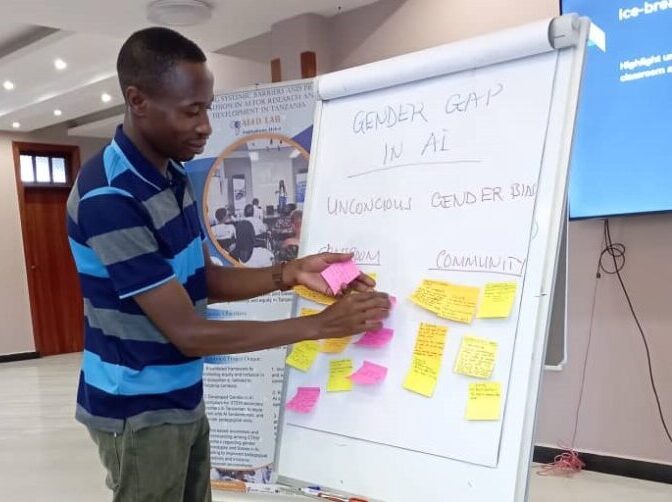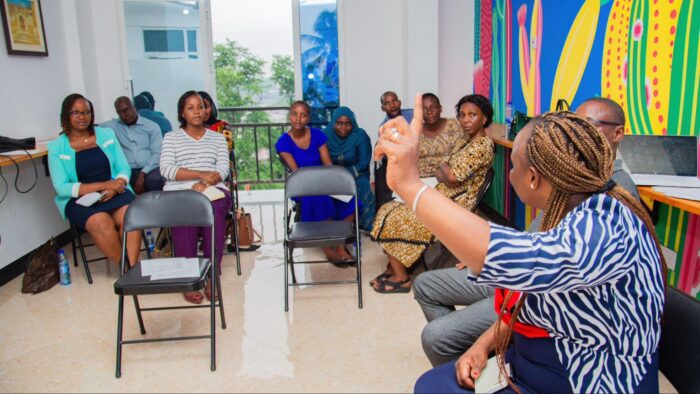In this fourth blog in the “Keeping the light on: Reflections on GEI and AI in Africa” series, Gloriana Monko, an avid AI practitioner, PhD researcher and Liaison Manager/Gender Coordinator of Africa’s Anglophone Multidisciplinary Research Lab, a part of AI4D, reflects on her lab’s journey to challenge traditional STEM education in the “Girls in AI” initiative.
Curiosity has driven me since birth, and my learning never ends
My experience as a girl was the pursuit and practice of subjects/courses which were believed to be the domain of men. Since my secondary school days, no one thought I could perform well in STEM subjects because I was a girl. I even overheard one of my male relatives remark that “She may seem smart, perhaps smart among fools.” This broke my heart. However, I was fortunate to have a mother and sister who truly trusted in me. I never wanted to disappoint them, so their support kept me focused and motivated to make them proud—which I did.
The skepticism didn’t end. People continued to doubt my abilities and even questioned my appearance, suggesting I looked more like someone who would pursue the arts rather than science. When I entered university, I chose to study for a Bachelor of Computer Science. The same judgments followed me, even from my college peers. It surprised them that I had chosen this career path, and they often assumed my achievements were due to privilege, not my own efforts. But you know what? This only made me stronger than I ever imagined. I enjoyed proving them wrong over and over. Now, I look back and realize how grateful I am for staying true to myself and never giving up!
Even now, when people are more aware of gender issues, they often fail to practice what they preach. I have observed this in many teams involving women; there tends to be less support when women lead than when men are in charge. Unfortunately, unconscious biases and persistent stereotypes still exist, even among women themselves.
AI4D Flashback Reflections
During the development of our AI4D proposal, we included gender-inclusive sections as part of our commitment to gender inclusivity, primarily because it was a mandatory requirement. Personally, I had already undergone transformative learning and gender pedagogical training, which greatly enhanced my understanding and practice of gender equality and inclusion (GEI) principles.
These principles include ensuring equal access to education for all genders, having inclusive curricula and teaching materials, and, most importantly, employing gender-sensitive teaching methods. Not only did I understand those principles, but I also got a chance to develop safeguarding and whistleblowing policies, which were meant to protect students and staff in the working environment, speaking of the University of Dodoma (UDOM), to be specific. So all that helped me recognize the importance of GEI in every aspect of the project.
I recognized the crucial importance of GEI in every aspect of the project. However, I doubt that many would have considered including gender-inclusive elements if it hadn’t been mandated. Once the project began, most team members at Dodoma Lab (Africa’s Anglophone Multidisciplinary Research Lab) only thought of gender equality in terms of recruitment (in terms of representation and/or parity, for instance), with no intentional focus on other aspects, largely because many couldn’t think beyond that initial step.
As the gender coordinator, I recall that any gender-related work was directed to me rather than involving the entire team since not everyone was fully prepared or confident about handling GEI tasks.
As AI4D-Dodoma Team
Our journey at Dodoma Lab (Africa’s Anglophone Multidisciplinary Research Lab) began with a straightforward mission: integrate gender and inclusivity into our core operations, including recruiting and sponsoring staff and students. We were committed to fostering a diverse and inclusive environment, believing firmly in raising awareness to ensure equality within the lab. Initially, our focus was not on gender integration in AI development itself. It wasn’t until we recognized the critical role that gender plays in the data and development of AI technologies after listening to presentations from Ladysmith in our workshop and during the mentorship offered by Gender at Work through the Ladysmith team that we began to see the broader implications and opportunities for impactful change.
A Shift in Focus: Girls in AI
This awakening led to the birth of the “Girls in AI” initiative. Our objective was not only to increase awareness about the gender disparities in AI but also to actively involve girls in coding. We aimed to spark a sustainable interest in AI among young women, which was essential for long-term change. This initiative was a pivotal moment for us, marking our transition from a passive to an active approach to addressing gender inequality in AI.

Deepening Our Understanding
Our commitment to gender inclusivity took a more structured form when we secured a significant project titled “Addressing Systemic Barriers and Promote Inclusion in AI for Research and Development in Tanzania,” focusing on enhancing the capacity of STEM secondary teachers in Tanzania. This project was not just another initiative; it was a deep dive into the practicalities and challenges of integrating GEI into AI education at the grassroots level. It gave us invaluable insights and a clearer perspective on what needed to be done.
Understanding that teachers are the primary influencers of the next generation, we decided to focus our efforts on capacitating STEM secondary teachers with knowledge about Gender and AI. We developed a comprehensive curriculum and conducted training sessions for these teachers. The curriculum was designed to equip them with the necessary skills to identify and overcome gender biases in the teaching methodologies they used as well as in the design of the classes. This included integrating AI concepts into their teaching, employing gender-sensitive language, and adopting inclusive teaching methods that encourage participation from all students, especially girls. For starters, we engaged a significantly small pool of 53 teachers from 15 secondary schools across 5 zones in Tanzania. The selected regions within 5 zones were Dar-es-Salaam, Dodoma, Mbeya, Mwanza, and Arusha. We received maximum cooperation from the heads of each school in which STEM teachers were drawn and honoured our invitation by allowing the teachers to attend the training successfully.
Training Success and Transformative Change
The training sessions proved to be a resounding success. Teachers were transformed from traditional educators to champions of gender-inclusive teaching. They reported a noticeable shift in their understanding of the importance of integrating gender and AI concepts to make STEM subjects more appealing and accessible to female students. The overall goal was to transform the traditional teaching paradigms to make STEM education a welcoming field for everyone, regardless of gender. This new paradigm involves using appropriate and inclusive language, becoming gender-transformative in their teaching practices, and being intentional in avoiding unconscious biases. It marks a departure from the previous approach by actively addressing and dismantling gender biases and stereotypes in STEM education.

Reflections and Moving Forward
Reflecting on this journey, our progress is notable. From initially focusing narrowly on recruitment and awareness to implementing a targeted intervention that changes the fabric of STEM education in Tanzania, our path has been both challenging and rewarding.
We had initially planned to assess the impact of the training on teaching and learning environments at the school level. However, due to budget and time constraints, we had to drop this project component. Additionally, we desired to involve more teachers representing more schools and districts but due to the same constraints, this was not able to be achieved. We also recognized the importance of engaging administrative personnel, i.e., education officers from Municipal Councils in charge of secondary school affairs or representatives from the Tanzania Institute of Education (TIE), to promote sustainability and champion advocacy. Despite these challenges, our project successfully shifted from only empowering the girls to a more sustainable model of empowering STEM teachers who are in a much better position to influence the learning landscape. We learned that true change requires both breadth and depth in approach integrating awareness, practical interventions, and systemic changes.
As we move forward, our aim is to refine these strategies and expand our impact. We plan to expand our efforts to empower STEM secondary teachers with comprehensive training on Gender and AI. This involves refining our curriculum and conducting more training sessions to help teachers overcome gender biases, integrate AI concepts, and adopt inclusive teaching methods. We will collaborate with the Tanzania Ministry of Education, Science and Technology and the Tanzania Institute of Education (TIE) to integrate gender equality and inclusion (GEI) into the national curriculum and develop robust monitoring and evaluation systems to assess the effectiveness of these initiatives.
This journey has been a testament to the power of targeted educational interventions and a reminder of the ongoing need for dedication to gender equality in every facet of AI and development research.
Gloriana Monko is a dedicated AI practitioner and a PhD researcher focusing on Natural Language Processing. She is also the Liaison Manager and Gender Coordinator of Africa’s Anglophone Multidisciplinary Research Lab. Her expansive research interests span machine learning, natural language processing, computer science, and significant initiatives in STEM, gender equality, and transformative learning. She is the founder of EmpowerHer Mind and co-founder of Elimunity and Women Supporting Women in the Sciences (WS2). You can find her on LinkedIn and on X. Africa’s Anglophone Multidisciplinary Research Lab: LinkedIn and X.
This work is openly licensed via CC BY 4.0.